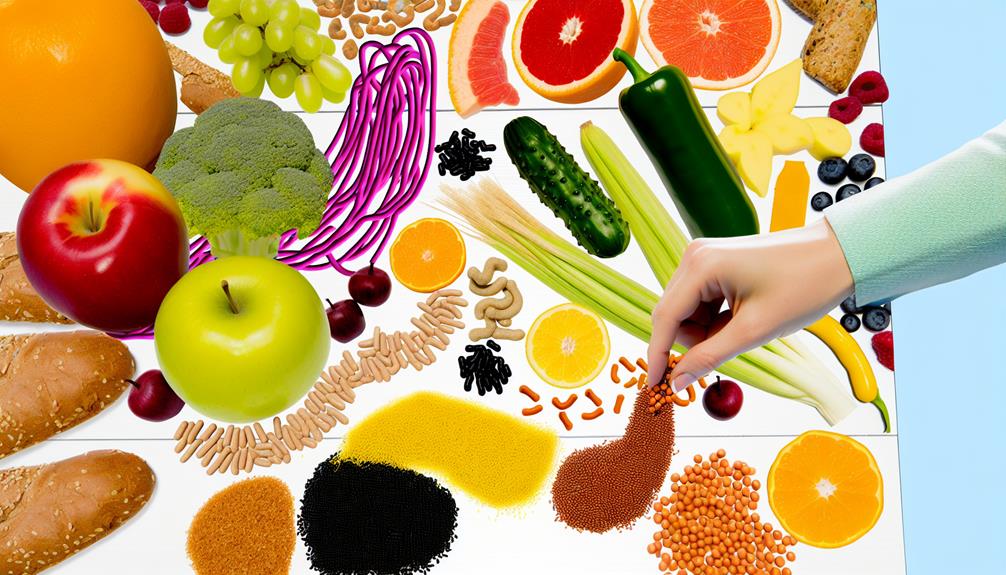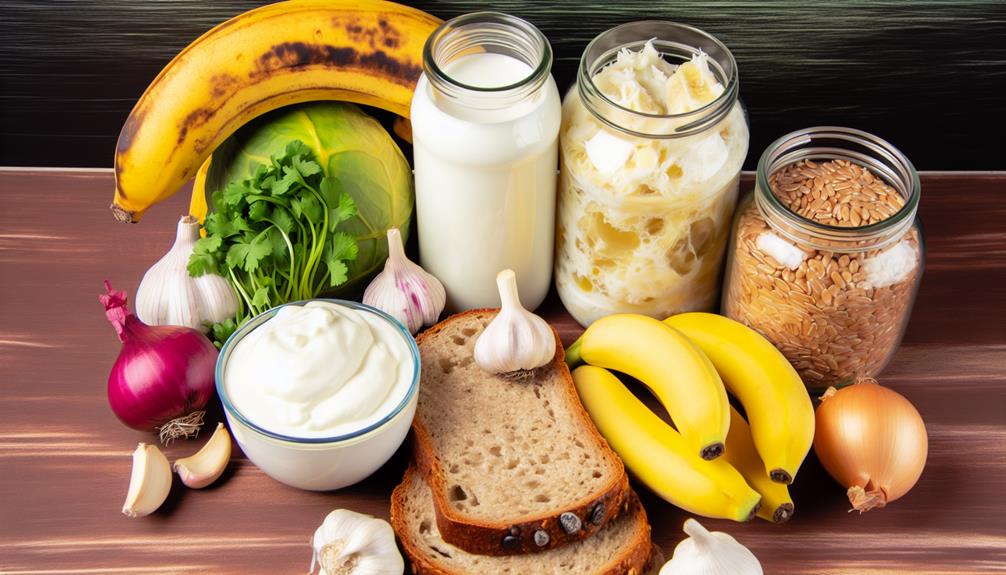So, you've heard about the latest trend in weight management and gut health, but the real question is: does it actually work? Well, let's take a closer look at the connection between Lean Bliss and gut health from a nutritional perspective. As you navigate through the complexities of maintaining a healthy weight and promoting gut wellness, you'll uncover some surprising insights and practical strategies that could make a significant difference in your overall well-being. Curious to learn more about how Lean Bliss and gut health intertwine? Keep reading to discover the science behind it all.
Understanding Lean Bliss
To understand LeanBliss, it's essential to grasp its role in stabilizing blood sugar levels for managing cravings and energy levels. LeanBliss is a weight management supplement designed to address unpredictable appetite swings and make adherence to a healthy diet easier. Its natural ingredients, including Cinnamon Bark Extract, Oleuropein, Xylitol, Corosolic Acid, Saffron Bulb, and others, work synergistically to promote healthy blood sugar levels, reduce body weight and fat mass, and manage inflammation. These components not only support weight management but also contribute to digestive health.
LeanBliss aims to stabilize blood sugar levels to improve energy, reduce cravings, and enhance mood. By doing so, it offers a comprehensive approach to health and wellness. The supplement's carefully selected ingredients provide a natural, safe solution with lasting and effective results. With the incorporation of Citrus Sinensis, Fucoidan, Kudzu Flower Extract, and Berberine, LeanBliss offers multiple benefits, including supporting digestive health, energy, and vitality.
The unique blend of ingredients in LeanBliss not only supports weight management but also plays a crucial role in supporting digestive health. By addressing blood sugar levels, it helps in managing cravings and stabilizing energy levels, making it easier to stick to a healthy diet. This comprehensive approach to health and wellness makes LeanBliss a valuable option for those looking for a natural and effective solution for weight management and digestive health.
The Gut Microbiome Connection
Understanding the impact of the gut microbiome on weight management and overall health is crucial for making informed decisions about nutrition and wellness. The gut microbiome, the collection of microorganisms living in your digestive tract, plays a significant role in regulating metabolism, reducing inflammation, and supporting weight management efforts. Here's how the gut microbiome connection impacts your health journey:
- Metabolism Regulation: A healthy gut microbiome can help regulate metabolism, influencing how your body processes and stores nutrients. Imbalances in gut microbiota have been linked to metabolic disorders and weight gain.
- Inflammation Reduction: A well-balanced gut microbiome can reduce inflammation, which is often associated with weight gain and various health issues. By promoting gut health, you can support your body's ability to manage inflammation.
- Blood Sugar Management: Imbalanced gut microbiota can lead to difficulties in managing blood sugar levels, potentially contributing to weight gain and metabolic issues. A healthy gut microbiome can aid in stabilizing blood sugar levels.
- Nutrient Absorption and Energy Production: The gut microbiome plays a crucial role in nutrient absorption and energy production, impacting overall well-being and vitality. Probiotics and fiber-rich foods can promote a healthy gut microbiome, supporting weight management and overall digestive health.
Understanding the gut microbiome connection can provide valuable insights into how to support your health journey through targeted nutritional choices and lifestyle habits.
Impact of Nutrition on Gut Health

When it comes to gut health, the impact of nutrition is significant. The microbiome in your gut is influenced by the foods you consume, and it plays a crucial role in your overall digestive health. Certain dietary patterns can contribute to digestive disorders, while others can support a healthy gut environment.
Microbiome and Nutrition
Consuming a diverse range of fiber-rich foods, prebiotics, and probiotics can significantly impact the composition and function of the gut microbiome, promoting overall gut health and well-being. To optimize your digestive health, consider the following:
- Fiber-Rich Foods: Incorporate a variety of fruits, vegetables, legumes, and whole grains into your diet to support the growth of beneficial gut bacteria.
- Prebiotics: Consume foods like garlic, onions, leeks, bananas, and asparagus to nourish the good bacteria in your gut.
- Probiotics: Include fermented foods such as yogurt, kefir, kimchi, and sauerkraut to introduce beneficial bacteria into your digestive system.
- Avoid Processed Foods: Minimize your intake of processed foods, high sugar diets, and artificial sweeteners, as they can disrupt the balance of your gut microbiome.
Maintaining a balanced and varied diet rich in whole, nutrient-dense foods is essential for promoting a healthy gut microbiome and supporting overall digestive health.
Digestive Disorders and Diet
To effectively manage digestive disorders and support gut health through nutrition, it is essential to adopt a balanced and personalized dietary approach. When considering digestive health, incorporating natural ingredients can play a crucial role in alleviating symptoms and promoting overall well-being. The table below outlines some natural ingredients and their potential benefits for digestive health.
| Natural Ingredient | Potential Benefits |
|---|---|
| Ginger | Aids in digestion and reduces nausea. |
| Peppermint | Eases indigestion and may reduce bloating. |
| Probiotic-rich foods | Help maintain a healthy balance of gut bacteria. |
| Turmeric | Anti-inflammatory properties may aid in digestion. |
Including these natural ingredients in your diet can contribute to managing digestive disorders and supporting a healthy gut. It's important to consult with a healthcare professional to personalize your dietary approach for optimal digestive health.
Nutrient-Dense Diet for Gut Wellness
You should aim to consume a nutrient-dense diet to support your gut wellness. Foods rich in fiber, prebiotics, and probiotics can promote a healthy microbiome and digestive system. Incorporating a variety of fruits, vegetables, whole grains, and fermented foods into your diet can help maintain gut health and overall well-being.
Microbiome and Nutrients
Regularly consuming a variety of nutrient-dense foods supports a healthy microbiome, contributing to overall gut wellness. This is crucial for digestive health and can provide numerous health benefits. Here's why a nutrient-dense diet is essential for your microbiome:
- Nutrient-dense foods like fruits, vegetables, and whole grains provide essential nutrients for gut health.
- Probiotics and prebiotics found in nutrient-dense foods help maintain a balanced and diverse microbiome.
- Consuming a variety of nutrient-dense foods supports the growth of beneficial gut bacteria.
- Nutrient-dense diets can help reduce inflammation and support a healthy gut lining.
Digestive System Health
Support your digestive system health with a nutrient-dense diet rich in essential vitamins, minerals, fiber, and beneficial bacteria. A holistic approach to digestive health involves consuming probiotic-rich foods like yogurt and kefir, which promote a healthy balance of gut bacteria. High-fiber foods such as fruits, vegetables, and whole grains aid digestion and prevent constipation, supporting gut wellness by promoting regular bowel movements. Including fermented foods like sauerkraut and kimchi in your diet can introduce beneficial bacteria into the digestive system, enhancing gut health. Additionally, lean proteins from sources like fish and poultry provide essential amino acids for tissue repair and overall gut function. By incorporating these elements into your diet, you can help maintain a healthy digestive system and support your overall well-being.
Role of Probiotics and Prebiotics

Probiotics and prebiotics are essential components of a healthy diet, supporting the growth of beneficial bacteria and contributing to overall gut health. Here's why they are crucial for digestive health and wellness:
- Probiotics play a vital role in supporting gut health by introducing beneficial bacteria into the digestive system. These live microorganisms can help improve digestion, boost immune function, and support overall well-being.
- Prebiotics serve as food for probiotics, aiding in their growth and activity in the gut. By promoting the growth of beneficial bacteria, prebiotics contribute to gut health and support efficient nutrient absorption.
- Both probiotics and prebiotics play a crucial role in maintaining a healthy balance of gut microbiota. This balance is essential for overall digestive health and wellness.
- Incorporating probiotics and prebiotics into your diet can have a positive impact on your digestive system health. They can help alleviate digestive issues, such as bloating and discomfort, and contribute to an overall sense of well-being.
Incorporating probiotic-rich foods like yogurt, kefir, and fermented vegetables, as well as prebiotic-rich foods such as bananas, onions, and garlic, can help support the growth of beneficial bacteria in the gut. By prioritizing these components in your diet, you can take proactive steps towards maintaining a healthy and balanced digestive system.
Gut-Healthy Foods and Recipes
Incorporating gut-healthy foods into your daily meals can significantly contribute to supporting overall digestive health and promoting efficient nutrient absorption. A balanced diet that includes high-fiber foods, fermented foods, prebiotic-rich ingredients, and lean proteins can help maintain a healthy gut microbiome and support optimal digestion. Here are some gut-healthy foods and recipes to consider incorporating into your meals:
| Gut-Healthy Foods | Recipes |
|---|---|
| Fruits and Vegetables | Grilled Vegetable Salad with Lemon Dressing |
| Whole Grains | Quinoa and Black Bean Stuffed Peppers |
| Fermented Foods | Homemade Greek Yogurt Parfait |
| Prebiotic-Rich Foods | Garlic and Herb Roasted Sweet Potatoes |
Fruits, vegetables, and whole grains are rich in fiber, which supports digestive health by promoting regular bowel movements and feeding beneficial gut bacteria. Additionally, fermented foods like yogurt, kefir, and kimchi contain probiotics that can aid in digestion and contribute to a healthy gut environment. Prebiotic-rich ingredients such as garlic, onions, and bananas can nourish the beneficial gut bacteria, while lean proteins like fish and poultry provide essential nutrients to support gut health and overall well-being.
Incorporating these gut-healthy foods and recipes into your diet can help promote digestive health, support the growth of beneficial gut bacteria, and contribute to overall well-being. Making mindful choices about the foods you consume can have a positive impact on your digestive system and overall health.
Lifestyle Factors and Gut Health

Did you know that lifestyle factors, such as diet, exercise, and stress management, are crucial for maintaining a healthy gut microbiome and supporting optimal digestive function? Here are some key lifestyle factors that can significantly impact your digestive health:
- Balanced Diet: Consuming a diet rich in fiber, fermented foods, and probiotics promotes a healthy gut microbiome, aiding in digestion and nutrient absorption.
- Regular Exercise: Engaging in regular physical activity not only supports weight management but also positively impacts gut health by reducing inflammation and promoting overall well-being.
- Stress Management: Chronic stress can negatively affect digestive health. Managing stress through techniques such as meditation, yoga, or mindfulness can help support a healthy gut.
- Hydration and Sleep: Adequate hydration and sufficient sleep are vital for optimal gut function and overall digestive health. Proper hydration supports the mucosal lining of the intestines, while sleep allows the body to repair and regenerate.
Achieving Lean Bliss Through Nutrition
Achieving Lean Bliss through nutrition involves incorporating natural ingredients like Cinnamon Bark Extract, Oleuropein, Xylitol, Corosolic Acid, Saffron Bulb, Fucoxanthin, Citrus Sinensis, Fucoidan, Kudzu Flower Extract, and Berberine to support healthy blood sugar levels and manage weight effectively. These ingredients play a crucial role in stabilizing blood sugar levels, managing cravings, and enhancing energy levels, which are essential factors in achieving and maintaining a state of lean bliss.
The blend of natural components in LeanBliss is specifically designed to target high blood sugar levels, promoting healthy weight management while reducing stress and anxiety. By stabilizing blood sugar, this supplement aims to improve energy levels, reduce cravings, and enhance overall mood, contributing to a comprehensive approach to health and wellness.
Furthermore, the inclusion of ingredients like Oleuropein, Saffron Bulb, and Kudzu Flower Extract supports digestive health, which is integral to achieving lean bliss. These components aid in promoting a healthy gut environment, facilitating better digestion and nutrient absorption, ultimately contributing to overall well-being and weight management.
When considering achieving lean bliss through nutrition, it is essential to focus on natural and evidence-based ingredients that support digestive health and blood sugar management. By incorporating these elements into your dietary regime, you can take proactive steps towards achieving and maintaining a state of lean bliss, promoting not only a healthy weight but also overall well-being.
Frequently Asked Questions
What to Eat to Lose Belly Fat?
If you're aiming to lose belly fat, focus on consuming whole, unprocessed foods like fruits, veggies, lean proteins, and healthy fats. Incorporate fiber-rich foods such as oats, legumes, and seeds to support digestion and keep you feeling full. Also, consider probiotic-rich foods like yogurt and kefir to promote a healthy gut. Exercise regularly and stay hydrated with water and herbal teas to optimize belly fat loss and overall health.
What Should I Eat to Lose Fat?
Want to shed fat? Consider intermittent fasting and carb cycling. Intermittent fasting helps control calorie intake, and carb cycling optimizes fat loss while preserving muscle. During fasting periods, your body burns stored fat for energy. Carb cycling strategically alternates high and low carb days to maximize fat loss. Combine these methods with a balanced diet and regular exercise for effective fat loss. Always consult a healthcare professional before making significant dietary changes.
